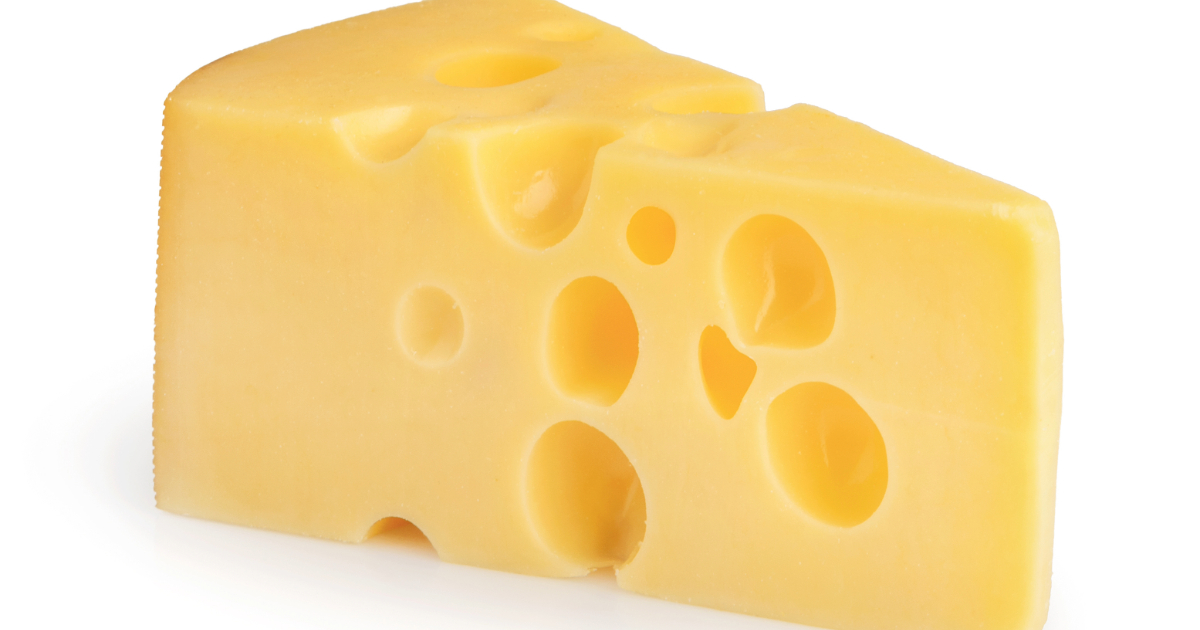Swiss cheese and pepper jack cheese are both popular varieties of cheese, but they have very different flavors, textures, and uses.

What Is Swiss Cheese
Swiss cheese is a general name for several related varieties of cheese that originated in Switzerland. The most common type of Swiss cheese found in the US is Emmental cheese.
Some key things to know about Swiss cheese:
- It has a pale yellow color and a firm, smooth texture with large holes or "eyes". The holes are formed by bubbles of carbon dioxide gas released during the cheesemaking process.
- Flavor is mild, sweet, and nutty. The larger the holes, the milder the flavor. Aged Swiss has more complex nutty, fruity flavors.
- Good melting properties make it perfect for grilled sandwiches, fondues, pasta bakes, etc. Doesn't oil out or separate when melted.
- Categorized as a semi-hard cheese. Harder than Monterey Jack but softer than cheddar.
- Made from cow's milk and aged 2 months to a year. Aged Swiss is excellent for eating as-is.
- Other types include Emmentaler, Gruyère, Appenzeller, Raclette, and Sbrinz. Differ in flavor/texture due to factors like milk type, aging duration.
What Is Pepper Jack Cheese
Pepper jack cheese is a spicy variant of Monterey Jack, an American cheese developed in California.
Here's what to know about pepper jack:
- Has Monterey Jack base with added spicy chiles and peppers, like jalapeño, chipotle, or habanero. Flavor ranges from mild spice to very hot.
- Smooth, firm, slightly moist texture. Melts well while retaining some structure when cooked.
- Color ranges from white to pale orange-red depending on type of pepper used. Often sold already shredded.
- Fresh, tangy Monterey Jack flavor with lingering heat that doesn't overwhelm other ingredients. More buttery than cheddar.
- Better in cooked dishes than on a cheese board. Pairs well with Mexican foods and grilled meats.
- Also comes in other flavor variants like garlic pepper jack or ghost pepper jack.
Comparing Flavor and Uses
Flavorwise, Swiss cheese is much milder than pepper jack. It has a subtle sweet, nutty taste that pairs well with fruits and nuts. Pepper jack is tangy and spicy with some buttery notes.
In cooking applications, both cheeses melt beautifully. Swiss can tone down highly spiced dishes with its mildness. Pepper jack integrates effortlessly into bold Southwestern or Mexican dishes.
Some popular uses for each cheese:
Swiss Cheese:
- Sandwiches like croque monsieur, Reubens
- Baked dishes - gratins, tarts
- Sauces: ale sauce, Mornay sauce
- Fondue
- Pair with fruits, wines, dark breads
Pepper Jack:
- Quesadillas, nachos, tacos
- Burgers and hot sandwiches
- Macaroni and cheese
- Grilled vegetables/meats
- Chili, enchiladas, fajitas
Swiss also shines in appetizers like cheese boards or platters paired with fruits and nuts. Pepper jack works better cooked into dishes than on a platter.
Key Takeaway: Swiss cheese has a mild nutty flavor while pepper jack is spicy, tangy and buttery.
Nutrition Comparison
Here is a nutrition comparison of equal servings of Swiss cheese and pepper jack cheese:
| Nutrient | Swiss Cheese | Pepper Jack |
|---|---|---|
| Fat | 28g | 19g |
| Saturated Fat | 18g | 12g |
| Protein | 25g | 19g |
| Carbs | <1g | <1g |
| Calcium | 27% DV | 32% DV |
| Sodium | 620mg | 510mg |
| Cholesterol | 105mg | 55mg |
| Vitamin A | 15% DV | 4% DV |
As shown in the table, Swiss cheese is higher in protein and cholesterol compared to pepper jack. Pepper jack provides less fat and calories per serving.
Both cheeses offer plenty of calcium to strengthen bones. But Swiss cheese also delivers extra vitamin A.
Key Takeaway: Swiss cheese packs more protein and vitamin A but is much higher in cholesterol. Pepper jack is lower in fat, sodium and calories.
Price Comparison
Since pepper jack starts with a Monterey Jack base, it is more expensive to produce than Swiss cheese in most cases.
The price also depends on factors like:
- Cheese style (imported vs domestic)
- Milk type (cow vs goat/sheep milk)
- Age (longer aged costs more)
- Artisanal vs mass-market brand
Under normal circumstances, you can expect to pay 10-50% more for pepper jack over a comparable Swiss cheese. For example, an 8 oz block of Swiss cheese may retail between $3 to $8 while pepper jack costs $4 to $10.
Which Cheese Should You Choose?
Swiss and pepper jack cheeses have very distinct flavors and nutrition profiles. Here is a summary comparing the two:
Swiss Cheese Pros:
- Nuttier, sweeter flavor
- Higher protein
- More calcium, vitamin A
- Lower in fat, sodium
- Melts extremely well
Pepper Jack Pros:
- Spicy, tangy flavor
- Lower cholesterol
- Good source of calcium
- Melts smoothly
- No added dyes
For a pick that offers mild flavor, excellent melting, and good nutrition, go for Swiss cheese. To add a spicy kick or southwestern flair, choose pepper jack.
Both Swiss and pepper jack work well in sandwiches, dips, pasta, etc. Pepper jack may be better for those limiting cholesterol or wanting less sodium. For a cheese lover, it's perfectly fine to keep both stocked in your fridge!
Key Takeaway: Swiss cheese offers great nutrition and melting properties. Pepper jack infuses dishes with flavorful spice. Stock both to satisfy different cravings!
FAQs
Is Swiss or pepper jack healthier?
It depends! Pepper jack is lower in cholesterol and sodium than Swiss. But Swiss cheese has extra protein, vitamin A and more calcium. For healthiest option, choose reduced-fat Swiss.
What spices are in pepper jack cheese?
Pepper jack is flavored with hot chile peppers like chipotle and jalapeño. Some varieties also contain spices like cayenne, cracked black pepper, rosemary, oregano and cumin.
Can I substitute Swiss for pepper jack or vice versa?
You can substitute one for the other in cooked dishes, but the flavor won't be the same. Swiss offers mild, nutty notes while pepper jack is spicy and tangy. Adjust other flavors in the dish to compensate.
Which cheeses melt the best?
Swiss, cheddar, Monterey Jack, mozzarella and Gruyère have excellent melting ability. Hard, crumbly cheeses and soft cheeses like cottage cheese do not melt smoothly.
What wine pairs best with pepper jack cheese?
Pepper jack pairs nicely with Zinfandel, Syrah, Sangiovese and Tempranillo. For whites, a full-bodied Viognier is a good match. Avoid sweet wines, which clash with spiciness.
Conclusion
While Swiss cheese and pepper jack have distinct differences in taste, texture and nutrition, they can both add wonderful flavor to cooked dishes and sandwiches.
Swiss cheese offers sweet, nutty flavor with excellent meltability. Its higher protein and calcium are advantages. Meanwhile, pepper jack infuses food with spicy Tang that pairs perfectly with Mexican cuisine.
The choice comes down to your own taste preferences and the flavors you want. Whether enjoying a toasted Swiss cheese sandwich or spicy pepper jack quesadillas, both cheeses guarantee a satisfying, indulgent eating experience.

